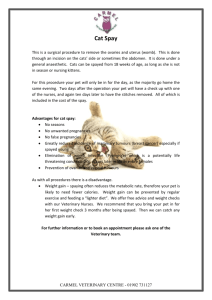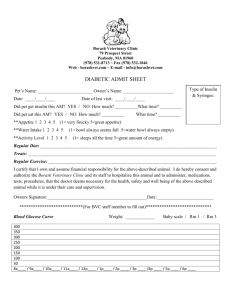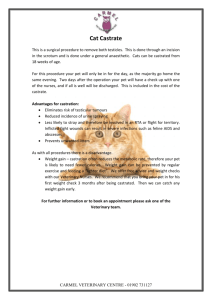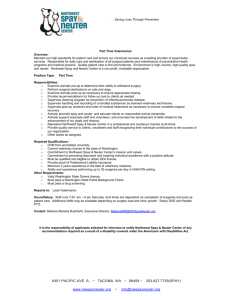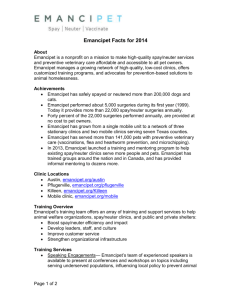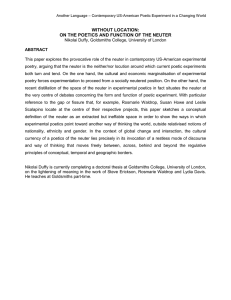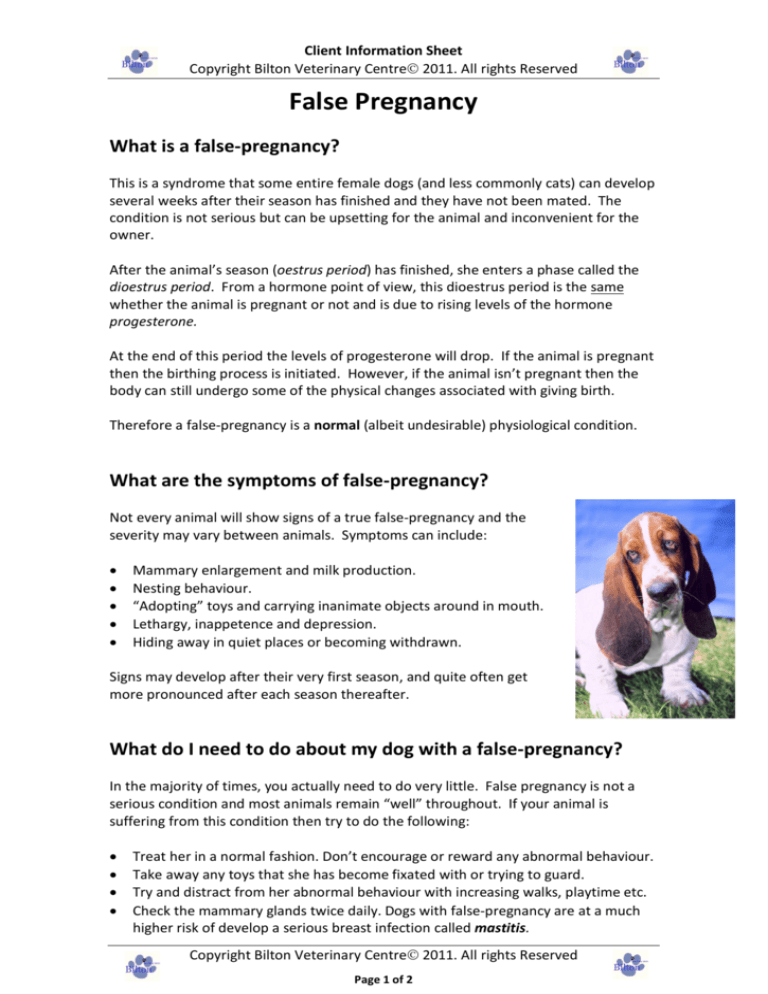
Client Information Sheet
Copyright Bilton Veterinary Centre 2011. All rights Reserved
False Pregnancy
What is a false-pregnancy?
This is a syndrome that some entire female dogs (and less commonly cats) can develop
several weeks after their season has finished and they have not been mated. The
condition is not serious but can be upsetting for the animal and inconvenient for the
owner.
After the animal’s season (oestrus period) has finished, she enters a phase called the
dioestrus period. From a hormone point of view, this dioestrus period is the same
whether the animal is pregnant or not and is due to rising levels of the hormone
progesterone.
At the end of this period the levels of progesterone will drop. If the animal is pregnant
then the birthing process is initiated. However, if the animal isn’t pregnant then the
body can still undergo some of the physical changes associated with giving birth.
Therefore a false-pregnancy is a normal (albeit undesirable) physiological condition.
What are the symptoms of false-pregnancy?
Not every animal will show signs of a true false-pregnancy and the
severity may vary between animals. Symptoms can include:
•
•
•
•
•
Mammary enlargement and milk production.
Nesting behaviour.
“Adopting” toys and carrying inanimate objects around in mouth.
Lethargy, inappetence and depression.
Hiding away in quiet places or becoming withdrawn.
Signs may develop after their very first season, and quite often get
more pronounced after each season thereafter.
What do I need to do about my dog with a false-pregnancy?
In the majority of times, you actually need to do very little. False pregnancy is not a
serious condition and most animals remain “well” throughout. If your animal is
suffering from this condition then try to do the following:
•
•
•
•
Treat her in a normal fashion. Don’t encourage or reward any abnormal behaviour.
Take away any toys that she has become fixated with or trying to guard.
Try and distract from her abnormal behaviour with increasing walks, playtime etc.
Check the mammary glands twice daily. Dogs with false-pregnancy are at a much
higher risk of develop a serious breast infection called mastitis.
Copyright Bilton Veterinary Centre 2011. All rights Reserved
Page 1 of 2
Client Information Sheet
Copyright Bilton Veterinary Centre 2011. All rights Reserved
When do I need to see the vet?
Generally, most dogs with a false-pregnancy will not need to seek veterinary attention.
However there are some occasions where a visit to the vet may be useful. These are:
•
•
•
•
•
If you think your pet may actually be pregnant/whelping!
If your pet is acting unwell at all
Your pet’s behaviour is severely depressed
She has been off her food for more than 24hrs
She is showing signs of mastitis:
- Painful mammary glands
- Redness of the mammary tissue
- Area(s) which are noticeably harder than the surrounding areas.
Can a False Pregnancy be treated?
Yes it can. If we feel that the dog’s health or wellbeing is being affected by the falsepregnancy, then we can intervene and give her a hormone medication called
cabergoline. Given orally, this medication usually causes all signs of the falsepregnancy to fade away over a period of 5-7 days.
Can False Pregnancies be prevented?
If your pet seems to suffer from recurrent episodes, then there are three options.
1. Let nature run its course and allow the false pregnancies to resolve on their
own accord. This is fine if the episodes are mild and the dog is not suffering.
2. Medically treat with cabergoline each time she has a false-pregnancy.
3. Neuter (spay) as this will prevent any further false pregnancies from occurring.
Can I neuter my animal whilst she is in a false-pregnancy?
Generally the advice here is no. If we were to spay an animal whilst she was in the
midst of an episode, then you can find that they actually enter a prolonged state of
false-pregnancy that can take much longer and be harder to settle down. The only
time we will neuter an animal in false-pregnancy is for emergency surgery such as
pyometra or a diabetic episode due to the hormones.
When is the best time to neuter my animal then if she keeps
having false-pregnancies?
We would advise leaving the animal for at least 4-6 weeks after all symptoms of the
false-pregnancy have disappeared before we neuter her.
Copyright Bilton Veterinary Centre 2011. All rights Reserved
Page 2 of 2

